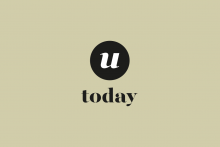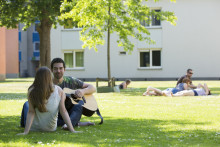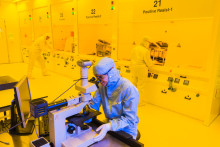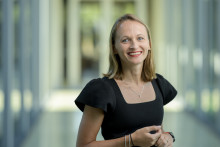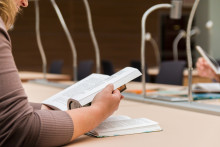Since Uzbekistan's independence from the former Soviet Union in 1991, the country has put a great deal of effort into the development of Information and Communication Technologies (ICT). In August 2001, Malohat Kamilova and Muzaffar Igamberdiev, along with two other Uzbek students (Otabek Kholikov and Abdugafar Adilov), came to the University of Twente on an EU fellowship that funds them for four months in an International Masters Program in Telematics. Specifically, Malohat and Muzaffar are interested in applying ICT to educational programs in Uzbekistan.
Graduates of Tashkent State Technical University, they bring with them, respectively, degrees in Electronic Engineering (1988) and Computer Engineering (2001). In addition, Malohat has worked in industry for over a decade: first, in the Turkish company, Optimum IBM, dealing in computer and telephone networks; and, later, for the South Korean company, Kabool Textiles, as an interpreter during the launching of a major joint project on cotton processing in Uzbekistan. In 1999 Malohat returned to TSTU to conduct research in the field of Information and Communication Technologies in Education. Here in Twente, the four Uzbek students join forces on projects that aim to bolster the educational opportunities in their native land. Regrettably, unless they find additional funding, they must return to Uzbekistan in December 2001.
The first project entails training teachers in Telematics, a new field in Computer Science that deals with the way in which computer networks work together and provide services to network users. The mission is to build a Masters Program in Telematics at TSTU in part to satisfy the dire need for teachers in Uzbekistan. Malohat and Muzaffar intend to design course materials, introduce educational technology, and create a local area network that will serve as a central information base for new teachers. The program began last year and already fifteen courses have been prepared, but more are needed to complete the program's curriculum.
Long-distance training defines the second project. Its goal is to establish a method by which Uzbek Masters' students at TSTU and Karshi Engineering Economic Institute can follow courses offered at participating European universities: UT, Technical University of Hamburg-Harburg (Germany), and Aalborg University (Denmark). On Monday, October 1, 2001, the UT Uzbek students began teaching a Masters class in Uzbekistan, using one of the fifteen courses designed for the afore-mentioned project. Coordinated by three Dutch faculty members: Hans Daemen (CS), Piet Kommers (TO), Cees Terlouw (TO), the class is evaluated from the Netherlands, and at the end of the term in November, a multiple choice test will be administered to gauge their success.
When Malohat and Muzaffar are not hard at work on their projects, they enjoy touring the Netherlands. For example, they had theirfirst glimpse of the sea here. And, this weekend they will travel to The Hague, representing the UT and TSTU at the tenth annual Students for Europe conference, where participants will investigate the ways in which communication and information technology affect work styles.
By the way, the UT was not their only option, but they are delighted that they selected it. In fact, the Uzbek students have even compiled a list of aspects of the UT they find most astonishing.
Twente Top Twenty:
(1) Cutting-edge technology, especially TeLeToP
(2) Open teacher-student rapport which enables students to voice opinions (in Uzbekistan, respect for elders prevents students from such behavior)
(3) Bicycles everywhere
(4) Unpredictable weather
(5) Organization
(6) The Bastille
(7) Active participation on the part of students - are teachers even needed?
(8) Pedagogical approach using group work
(9) International environment where a genuine cultural exchange takes place
(10) Free discussion of ideas
(11) Dutch people who so willingly and proficiently speak English
(12) Freedom of teachers to design exams
(13) SMIT
(14) Flowers
(15) Abundance of water (consider that in Uzbekistan, the Aral Sea has lost over 80% of its water in the past forty years)
(16) Absence of policemen
(17) Generous monthly stipends
(18) Library with centralized information system
(19) Websites for everything
(20) Party life - "students seem to like parties more than the courses themselves"



